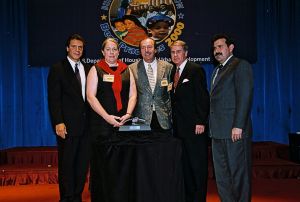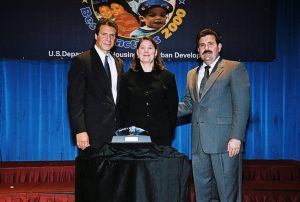 |
2000 Best Practice Awards
Best of the Best Winners: Indiana
Best Practice: Back Home in Indiana
BACK HOME IN INDIANA: HOMEOWNERSHIP FOR
PEOPLE WITH DISABILITIES
Indianapolis, Indiana. Back Home in Indiana (BHII) works throughout the
state to assist people with disabilities to realize the American dream of
homeownership. People with disabilities are significantly underrepresented
in homeownership because of limited income (in most cases), need for modifications
to the home or need for supportive services. BHII establishes teams
of providers of housing and supportive services in selected areas of the
state to work with people with disabilities.
In Marion County, BHII established a homeownership
committee that includes representatives from Habitat for Humanity, the Indianapolis
Neighborhood Housing Partnership, Near North Development Corporation, HUD,
Indianapolis Resource Center for Independent Living and Independent Residential
Living of Central Indiana, among others.
To date, one person with disabilities has
become a homeowner, two are working with Habitat for Humanity to become
homeowners and three others are at various stages of purchasing a home.
Each of the disabled potential homeowners is considered individually, and
the person’s needs are addressed by structuring a program that will
facilitate the home buying process. For example, the one disabled person
who has become a homeowner did so by receiving the following assistance
as a result of BHII’s efforts:
- BHII coordinated the team assisting the
homeowner.
- The Indianapolis Neighborhood Housing Partnership
provided homeownership counseling, secured a loan at 1 percent below
conventional rates and provided $5,000 in down payment and closing cost assistance.
- The Indiana Department of Vocational Rehabilitation
provided approximately $3,000 in funds for
modifications to make the property accessible to the homebuyer.
- A friend of the homebuyer built a temporary
ramp.
Organizations across the country can easily
assemble a similar team of housing and support services
providers and organizations serving people with disabilities to help foster
homeownership.
Contact: Debra McCarty, Phone: (317) 274-6865
Tracking Number: 619
Winning Category: Program (Community Builder)
Best Practice: Tibbs Court
Tibbs Court: Innovation in Housing Finance
Indianapolis, Indiana. Tibbs Court, located in the Near Westside neighborhood
of Indianapolis, is a scattered-site, 50-unit housing development, one of
the first in the nation to be financed with a combination of low-income
housing tax credits and public housing subsidies as well as HOME and CDBG
funds. The project includes both renovated and newly constructed homes for
rent to public housing and low-income families who agree to participate
in the Tibbs Court Homeownership Preparedness Program, which provides homeownership
opportunities to residents.
Central to this redevelopment effort are the
creation of resident initiatives and economic |

Monica Thompson/Mark Stokes/George Courtney
receiving Best of the Best award from Secretary Cuomo (l) and Deputy Secretary
Ramirez (r) |
development activities designed to produce
meaningful forms of economic independence within two years, including the
opportunity for homeownership. To be eligible for the program, residents
must establish homeownership, higher education and employment goals. By
participating in this program, residents can reside in one of the Tibbs
Court units, while attending a series of classes on homeownership.
The Indianapolis’ Housing Authority approached
WCDC in early 1996 to participate in a Low-Income Housing Tax Credit project
that was part of the agency’s efforts to revitalize the neighborhood
surrounding the Concord Village and Eagle Creek public housing sites. The
scattered site development, which includes both rehabilitation and new construction,
is unique in that participation in its homeownership-training program is
a requirement of tenancy.
The Tibbs Court development occurred at the
same time as comprehensive neighborhood stabilization activities for the
Near Westside. The stabilization included the total demolition of all 310
units at Concord Village and Eagle Creek, two of the most distressed public
housing communities in the city, and the Weed and Seed Initiative, a comprehensive
effort to deal with violent crime and drug trafficking. In an unprecedented
display of cooperation, the city, Indianapolis Housing Authority and the
Westside Community Development Corporation (WCDC) fostered an alternative
project to traditional public housing that involves placing residents in
new or rehabilitated homes scattered throughout the community. In addition,
the project incorporated elements of the “New Urbanism” planning
movement, which advocates a return to traditional city housing and
neighborhood styles. The newly developed housing is available for rent to
low-income families who want to become homeowners.
Through the combined efforts of WCDC’s
homeownership staff and the HOPE VI Program, residents receive help in building
Homeownership Development Accounts to assist in downpayment costs. They
are given credit and investment counseling so that they can be prepared
to purchase their own home. The Indianapolis Housing Authority through its
Family Self-Sufficiency Program offers Tibbs Court residents other social
services until they can become independent.
All 50 units at Tibbs Court are occupied by
residents enrolled in the program, and 40 more people are on a waiting
list. The program also has positively affected the community by acting as
a catalyst for new neighborhood improvement projects. This project is the
first mixed-finance project for affordable housing developed in Indianapolis
and one of the few like it anywhere in the United States.
Contact: George Courtney, Telephone: (317)
327-5854
Tracking Number: 987
Winning Category: Geographic |
Best Practice: NAACP Community Development
Resource Center
NAACP Helping Gary Resident’s Increase
Homeownership
| Gary, Indiana.
Although Gary, Indiana, has a variety of housing counseling programs, the
NAACP’s Community Development Resource Center provides information
to potential homeowners in jargon-free language. “It’s a matter
of explaining in a way that users can understand and that opens their awareness
to the homebuying process,” says Mary Ward of the NAACP. Ward has observed
programs that lose clients because “the participants won’t ask
questions,” she says. “They’ll sit and listen but won’t
ask questions.” To date, 33 individuals and families have become homeowners
through the city’s first-time |

Jannine Auerbach (c) receiving Best of the
Best award from Secretary Cuomo (l) and Deputy Secretary Ramirez (r) |
homebuyers program, and an additional 13 have
become first-time homeowners through private contributions. More than 300
potential homeowners have participated in the NAACP program, and 214 participants
have been issued certificates for successful completion of the program.
The program, which is partially funded by
$30,000 in HUD HOME funds and $100,000 in funding from Bank One, is geared
toward first-time low- to moderate-income potential homebuyers since approximately
15,000 of the city’s 40,750 population are renters. Home sales have
lagged behind those in nearby communities. As a result, the city of
Gary identified homeownership as one of its top priorities.
The NAACP’s program, which operates in
partnership with the city’s down payment assistance program, offers
workshops on preparing for homeownership, shopping for a home, obtaining
a mortgage, the closing process and life as a homeowner. Other partners
include Fannie Mae, which has approved the program, and Freddie Mac.
The program is so successful that classes
fill based on word of mouth. “Because of realtors referring us, we no
longer have to advertise,” says Ward. “Sometimes there’s
a waiting list.” Small classes ensure that participants receive the
attention and information they need to help them through the home ownership
process.
Armed with information, participants are empowered
to raise questions when necessary. “I’ve had people come to class
and they’ve learned so much,” says Ward, “that they go to
lenders and challenge them. It gives potential homebuyers an understanding
of what they are up against.”
Contact: Jeanne Meggs, Phone: (301) 226-7237
Tracking Number: 159
Winning Category: Program (Community Planning and Development) |
Return to Best
Practices 2000 Best of the Best Winners
Content Archived: April 20, 2011 |